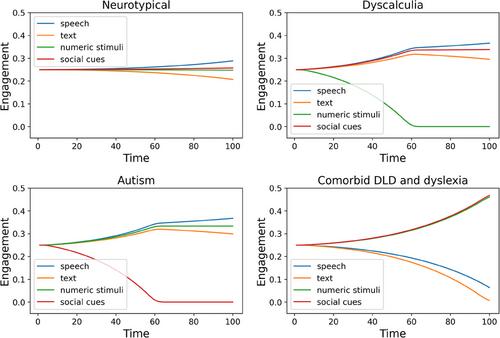Rational inattention: A new theory of neurodivergent information seeking
Abstract
This paper presents rational inattention as a new, transdiagnostic theory of information seeking in neurodevelopmental conditions that have uneven cognitive and socio-emotional profiles, including developmental language disorder (DLD), dyslexia, dyscalculia and autism. Rational inattention holds that the optimal solution to minimizing epistemic uncertainty is to avoid imprecise information sources. The key theoretical contribution of this report is to endogenize imprecision, making it a function of the primary neurocognitive difficulties that have been invoked to explain neurodivergent phenotypes, including deficits in auditory perception, working memory, procedural learning and the social brain network. We argue that disengagement with information sources with low endogenous precision (e.g. speech in DLD, orthography-phonology mappings in dyslexia, numeric stimuli in dyscalculia and social signals in autism) constitutes resource-rational behaviour. We demonstrate the strength of this account in a series of computational simulations. In experiment 1, we simulate information seeking in artificial agents mimicking an array of neurodivergent phenotypes, which optimally explore a complex learning environment containing speech, text, numeric stimuli and social cues. In experiment 2, we simulate optimal information seeking in a cross-modal dual-task paradigm and qualitatively replicate empirical data from children with and without DLD. Across experiments, simulated agents’ only aim was to maximally reduce epistemic uncertainty, with no difference in reward across information sources. We show that rational inattention emerges naturally in specific neurodivergent phenotypes as a function of low endogenous precision. For instance, an agent mimicking the DLD phenotype disengages with speech (and preferentially engages with alternative precise information sources) because endogenous imprecision renders speech not conducive to information gain. Because engagement is necessary for learning, simulation demonstrates how optimal information seeking may paradoxically contribute negatively to an already delayed learning trajectory in neurodivergent children.
Research Highlights
- We present the first comprehensive theory of information seeking in neurodivergent children to date, centred on the notion of rational inattention.
- We demonstrate the strength of this account in a series of computational simulations involving artificial agents mimicking specific neurodivergent phenotypes that optimally explore a complex learning environment containing speech, text, numeric stimuli, and social cues.
- We show how optimal information seeking may, paradoxically, contribute negatively to an already delayed learning trajectory in neurodivergent children.
- This report advances our understanding of the factors shaping short-term decision making and long-term learning in neurodivergent children.


 求助内容:
求助内容: 应助结果提醒方式:
应助结果提醒方式:


